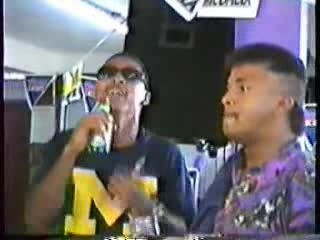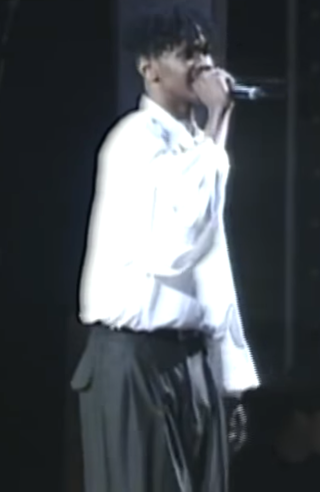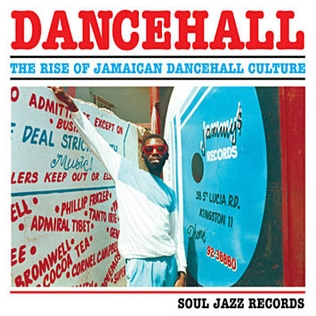The music of Latin America refers to music originating from Latin America, namely the Spanish and Portuguese-speaking regions of the Americas south of the United States. Latin American music also incorporate the indigenous music of Latin America. Due to its highly syncretic nature, Latin American music encompasses a wide variety of styles, including influential genres such as cumbia, bachata, bossa nova, merengue, rumba, salsa, samba, son, candombe and tango. During the 20th century, many styles were influenced by the music of the United States giving rise to genres such as Latin pop, rock, jazz, hip hop, and reggaeton.
In Jamaican dancehall music, a riddim is the instrumental accompaniment to a song and is synonymous with the rhythm section. Jamaican music genres that use the term consist of the riddim plus the voicing sung by the deejay. A given riddim, if popular, may be used in dozens—or even hundreds—of songs, not only in recordings but also in live performances.
Dancehall is a genre of Jamaican popular music that originated in the late 1970s. Initially, dancehall was a more sparse version of reggae than the roots style, which had dominated much of the 1970s. It wasn't until the 1980s when the style was officially named when the two words Dance and Hall the common venue was joined to make one word DanceHall; for the first time staged and promoted on an international scale. In this time digital instrumentation became more prevalent, changing the sound considerably, with digital dancehall becoming increasingly characterized by faster rhythms. Key elements of dancehall music include its extensive use of Jamaican Patois rather than Jamaican standard English and a focus on the track instrumentals.

The Music of Puerto Rico has evolved as a heterogeneous and dynamic product of diverse cultural resources. The most conspicuous musical sources of Puerto Rico have primarily included African, Taino Indigenous, and European influences. Puerto Rican music culture today comprises a wide and rich variety of genres, ranging from essentially native genres such as bomba, jíbaro, seis, danza, and plena to more recent hybrid genres such as salsa, Latin trap and reggaeton. Broadly conceived, the realm of "Puerto Rican music" should naturally comprise the music culture of the millions of people of Puerto Rican descent who have lived in the United States, especially in New York City. Their music, from salsa to the boleros of Rafael Hernández, cannot be separated from the music culture of Puerto Rico itself.

Reggaeton is a modern style of popular and electronic music that originated in Panama during the late 1980s, and which rose to prominence in the late 1990s and early 2000s through a plethora of Puerto Rican musicians. It has evolved from dancehall, with elements of hip hop, Latin American, and Caribbean music. Vocals include toasting/rapping and singing, typically in Spanish.
Rexton Rawlston Fernando Gordon OD, better known by his stage name Shabba Ranks, is a Jamaican dancehall musician. In the late 1980s and early 1990s, he was one of the most popular Jamaican musicians in the world. Throughout his prominence in his home country as a dancehall artist, he gained popularity in North America with his studio album Just Reality in 1990. He released other studio albums, including As Raw as Ever and X-tra Naked, which both won a Grammy Award as Best Reggae Album in 1992 and 1993, respectively. He is notoriously popular for "Mr. Loverman" and "Ting-A-Ling", which were globally acclaimed and deemed his signature songs.

Edgardo Armando Franco, better known as El General, is a Panamanian former reggae artist considered by some to be one of the fathers of reggae en Español and a precursor to reggaetón.
Oswald Priest, better known as Mad Lion, is a dancehall, ragga musician and rapper. He frequently collaborates with fellow hip hop artist KRS-One. His awards include the 1994 Source Award as Reggae Artist of the Year, and the 1995 Source Award as Reggae Hip-Hop Artist of the Year.
The Stalag riddim is a popular reggae riddim, which came to prominence in the 1980s. It was originally written and recorded as "Stalag 17" by Ansel Collins and released by Winston Riley's Techniques record label in 1973. The riddim has been used on hundreds of derivative records.

Philip Thomas, better known as Cutty Ranks, is a Jamaican dancehall singer.
Bachatón is a fusion genre of reggaeton from Panama and Puerto Rico as well as bachata from the Dominican Republic. Bachaton combines bachata melodies and reggaeton style beats, lyrics, rapping, and disc jockeying. The word "bachatón" is a portmanteau of "bachata" and "reggaeton". "Bachatón" was coined and widely accepted in 2005. It is a subgenre of reggaeton and bachata.

Just Reality is the second solo studio album by Jamaican dancehall/reggae recording artist Shabba Ranks. Released in 1990 via VP Records, the album was produced by Bobby "Digital" Dixon.
In Panama, dancehall reggae sung in Spanish language by artists of Latin American origin is known as Reggae en Español. It originated in the late 1980s in Panama. Reggae en Español goes by several names; in Panama, it is called "La Plena panameña".
"Dem Bow" is a song performed by Jamaican reggae artist Shabba Ranks, produced by Bobby Digital. This song uses the "Ku-Klung-Klung"/"Poco Man Jam" riddim created by Jamaican producers Steely & Clevie in the late 1980s. The lyrics are anti-imperialist and also anti-homosexual, as Ranks compares those who perform sodomy to those who submit to colonialism.

"Murder She Wrote" is a song by Jamaican reggae duo Chaka Demus & Pliers, from their 1993 album Tease Me. It was first released as a single in 1992 and again in late 1993 by Mango and Taxi Records, reaching number 27 on the UK Singles Chart in early 1994, and number 57 on the US Billboard Hot 100, spending 17 weeks there. The song was certified gold in the UK in 2022. The music to the song is based on the Maytals' 1966 song "Bam Bam", while the lyrics discuss abortion.
Urbano music or Latin urban is a transnational umbrella category including many different genres and styles. As an umbrella term it includes a wide and diverse set of genres and styles such as dancehall, dembow, urban champeta, funk carioca, Latin hip hop and reggaeton. The commercial breakthrough of this music took place in 2017 with artists from Colombia, Cuba, the Dominican Republic, Panama, Puerto Rico, the United States, Venezuela and even non-Spanish-speaking nations, such as Brazil, where Portuguese is spoken.
Dancehall pop is a sub-genre of the Jamaican genre dancehall that originated in the early 2000s. Developing from the sounds of reggae, dancehall pop is characteristically different in its fusion with western pop music and digital music production. Dancehall pop is also different from dancehall in that most songs use lesser Jamaican Patois in lyrics––allowing it to be globally understood and consumed. It also incorporates the key pop music elements of having melodies, hooks, and the verse-chorus format. Additionally, the genre moves away from the reggae and roots reggae music origins in social and political protest, now lyrically centering on partying, dancing, and sexuality.

Dancehall is a 2008 compilation album of dancehall music released between the late 1970s and 1993.







